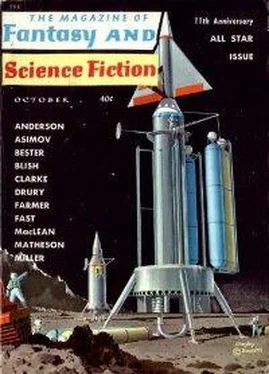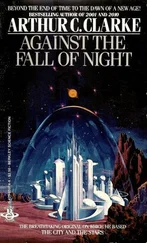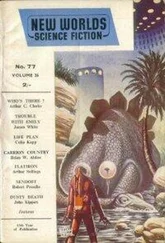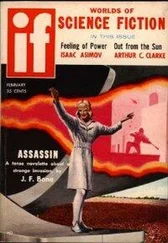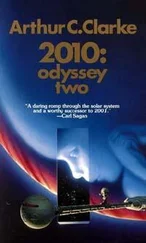Arthur Clarke - Into the Comet
Здесь есть возможность читать онлайн «Arthur Clarke - Into the Comet» весь текст электронной книги совершенно бесплатно (целиком полную версию без сокращений). В некоторых случаях можно слушать аудио, скачать через торрент в формате fb2 и присутствует краткое содержание. Год выпуска: 1960, Издательство: Mercury Press, Inc., Жанр: Фантастика и фэнтези, на английском языке. Описание произведения, (предисловие) а так же отзывы посетителей доступны на портале библиотеки ЛибКат.
- Название:Into the Comet
- Автор:
- Издательство:Mercury Press, Inc.
- Жанр:
- Год:1960
- ISBN:нет данных
- Рейтинг книги:3 / 5. Голосов: 1
-
Избранное:Добавить в избранное
- Отзывы:
-
Ваша оценка:
- 60
- 1
- 2
- 3
- 4
- 5
Into the Comet: краткое содержание, описание и аннотация
Предлагаем к чтению аннотацию, описание, краткое содержание или предисловие (зависит от того, что написал сам автор книги «Into the Comet»). Если вы не нашли необходимую информацию о книге — напишите в комментариях, мы постараемся отыскать её.
Into the Comet — читать онлайн бесплатно полную книгу (весь текст) целиком
Ниже представлен текст книги, разбитый по страницам. Система сохранения места последней прочитанной страницы, позволяет с удобством читать онлайн бесплатно книгу «Into the Comet», без необходимости каждый раз заново искать на чём Вы остановились. Поставьте закладку, и сможете в любой момент перейти на страницу, на которой закончили чтение.
Интервал:
Закладка:
Into the Comet
by Arthur C. Clarke
I don’t know why I’m recording this,” said George Takeo Pickett slowly into the hovering microphone. “There’s no chance that anyone will ever hear it. They say the comet will bring us back to the neighbourhood of Earth in about two million years, when it makes its next turn around the sun. I wonder if mankind will still be in existence then, and whether the comet will put on as good a display for our descendants as it did for us? Maybe they’ll launch an expedition, just as we have done, to see what they can find. And they’ll find us…
“For the ship will still be in perfect condition, even after all those ages. There’ll be fuel in the tanks, maybe even plenty of air, for our food will give out first, and we’ll starve before we suffocate. But I guess we won’t wait for that; it will be quicker to open the air lock and get it all over.
“When I was a kid, I read a book on polar exploration called Winter Amid the Ice . Well, that’s what we’re facing now. There’s ice all around us, floating in great porous bergs. Challenger’s in the middle of a cluster, orbiting round one another so slowly that you have to wait several minutes before you’re certain they’ve moved. But no expedition to Earth’s poles ever faced our winter. During most of that two million years, the temperature will be four hundred and fifty below zero. “We’ll be so far away from the sun that it’ll give about as much heat as the stars. And who ever tried to warm his hands by Sirius on a cold winter night?”
That absurd image, coming suddenly into his mind, broke him up completely. He could not speak because of memories of moonlight upon snowfields, of Christmas chimes ringing across a land already fifty million miles away. Suddenly he was weeping like a child, his self-control dissolved by the remembrance of all the familiar, disregarded beauties of the Earth he had forever lost.
And everything had begun so well, in such a blaze of excitement and adventure. He could recall (was it only six months ago?) the very first time he had gone out to look for the comet, soon after eighteen-year-old Jimmy Randall had found it in his home-made telescope and sent his famous telegram to Mount Stromlo Observatory. In those early days, it had been only a faint polliwog of mist, moving slowly through the constellation of Eridanus, just south of the Equator. It was still far beyond Mars, sweeping sunward along its immensely elongated orbit. When it had last shone in the skies of Earth, there were no men to see it, and there might be none when it appeared again. The human race was seeing Randall’s comet for the first and perhaps the only time.
As it approached the sun, it grew, blasting out plumes and jets, the smallest of which was larger than a hundred Earths. Like a great pennant streaming down some cosmic breeze, the comet’s tail was already forty million miles long when it raced past the orbit of Mars. It was then that the astronomers realized that this might be the most spectacular sight ever to appear in the heavens; the display put on by Halley’s comet, back in 1986, would be nothing in comparison. And it was then that the administrators of the International Astrophysical Decade decided to send the research ship Challenger chasing after it, if she could be fitted out in time; for here was a chance that might not come again in a thousand years.
For weeks on end, in the hours before dawn, the comet sprawled across the sky like a second but far brighter Milky Way. As it approached the sun, and felt again the fires it had not known since the mammoths shook the Earth, it became steadily more active. Gouts of luminous gas erupted from its core, forming great fans which turned like slowly swinging searchlights across the stars. The tail, now a hundred million miles long, divided into intricate bands and streamers which changed their patterns completely in the course of a single night. Always they pointed away from the sun, as if driven starwards by a great wind blowing forever outwards from the heart of the solar system.
When the Challenger assignment had been given to him, George Pickett could hardly believe his luck. Nothing like this had happened to any reporter since William Laurence and the atom bomb. The facts that he had a science degree, was unmarried, in good health, weighed less than one hundred and twenty pounds, and had no appendix undoubtedly helped. But there must have been many others equally qualified; well, their envy would soon turn to relief.
Because the skimpy payload of Challenger could not accommodate a mere reporter, Pickett had had to double up in his spare time as executive officer. This meant, in practice, that he had to write up the log, act as captain’s secretary, keep track of stores, and balance the accounts. It was very fortunate, he often thought, that one needed only three hours, sleep in every twenty-four, in the weightless world of space.
Keeping his two duties separate had required a great deal of tact. When he was not writing in his closet-sized office, or checking the thousands of items stacked away in stores, he would go on the prowl with his recorder. He had been careful, at one time or another, to interview every one of the twenty scientists and engineers who manned Challenger . Not all the recordings had been radioed back to Earth; some had been too technical, some too inarticulate, and others too much the reverse. But at least he had played no favourites and, as far as he knew, had trodden on no toes. Not that it mattered now.
He wondered how Dr Martens was taking it; the astronomer had been one of his most difficult subjects, yet the one who could give most information. On a sudden impulse, Pickett located the earliest of the Martens tapes, and inserted it in the recorder. He knew that he was trying to escape from the present by retreating into the past, but the only effect of that self-knowledge was to make him hope the experiment would succeed.
He still had vivid memories of that first interview, for the weightless microphone, wavering only slightly in the draught of air from the ventilators, had almost hypnotized him into incoherence. Yet no one would have guessed: his voice had its normal, professional smoothness.
They had been twenty million miles behind the comet, but swiftly overtaking it, when he had trapped Martens in the observatory and thrown that opening question at him.
“Dr Martens,” he began, “just what is Randall’s comet made of?”
“Quite a mixture,” the astronomer had answered, “and it’s changing all the time as we move away from the sun. But the tail’s mostly ammonia, methane, carbon dioxide, water vapour, cyanogen—”
“Cyanogen? Isn’t that a poison gas? What would happen if the Earth ran into it?”
“Not a thing. Though it looks so spectacular, by our normal standards a comet’s tail is a pretty good vacuum. A volume as big as Earth contains about as much gas as a matchbox full of air.”
“And yet this thin stuff puts on such a wonderful display!”
“So does the equally thin gas in an electric sign, and for the same reason. A comet’s tail glows because the sun bombards it with electrically charged particles. It’s a cosmic sky-sign; one day, I’m afraid, the advertising people will wake up to this, and find a way of writing slogans across the solar system.”
“That’s a depressing thought—though I suppose someone will claim it’s a triumph of applied science. But let’s leave the tail; how soon will we get into the heart of the comet—the nucleus, I believe you call it?”
“Since a stern chase always takes a long time, it will be another two weeks before we enter the nucleus. We’ll be ploughing deeper and deeper into the tail, taking a cross section through the comet as we catch up with it. But though the nucleus is still twenty million miles ahead, we’ve already learned a good deal about it. For one thing, it’s extremely small—less than fifty miles across. And even that’s not solid, but probably consists of thousands of smaller bodies, all milling round in a cloud.”
Читать дальшеИнтервал:
Закладка:
Похожие книги на «Into the Comet»
Представляем Вашему вниманию похожие книги на «Into the Comet» списком для выбора. Мы отобрали схожую по названию и смыслу литературу в надежде предоставить читателям больше вариантов отыскать новые, интересные, ещё непрочитанные произведения.
Обсуждение, отзывы о книге «Into the Comet» и просто собственные мнения читателей. Оставьте ваши комментарии, напишите, что Вы думаете о произведении, его смысле или главных героях. Укажите что конкретно понравилось, а что нет, и почему Вы так считаете.
